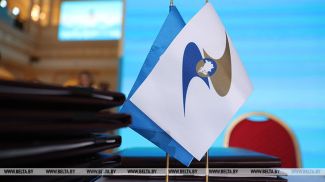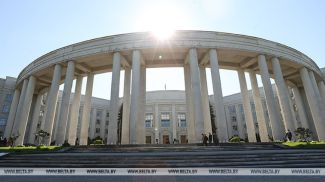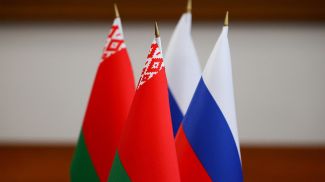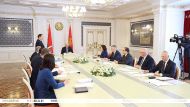MINSK, 19 September (BelTA) – Belarus will develop a plan of action to enhance financial literacy of the population for 2019-2024, Sergei Kalechits, Deputy Chairman of the Board of the National Bank of the Republic of Belarus (NBRB), told the media on the sidelines of the high-level conference on the OECD financial education project for the countries of the Commonwealth of Independent States, BelTA has learned.
"We cooperate with several international organizations while implementing the policy to enhance the financial literacy of the population. The last program we joined is being implemented in several countries of the CIS by the OECD. The project is aimed at improving the whole range of areas to increase the financial literacy. Today we discussed its parts including the developing of the new strategy to enhance the financial literacy. We now have a plan of action for 2013-2018 and we consider developing the new plan or strategy for 2019-2024," Sergei Kalechits said. He stressed that Belarus will need the OECD support in this regard.
The OECD project is aimed to improve the methodology of population surveys and to create the uniform environment to assess the financial literacy level in all the countries that the project covers. "The important area is the work with target groups including pupils and students. These people are starting their economic journey and we need to take every effort to raise their financial awareness in order to save them from possible mistakes," Sergei Kalechits noted.
He emphasized that it is difficult to overestimate the importance of financial literacy. "Financial instruments are getting more and becoming easily accessible. On the other hand when there is a great choice it is easy to get confused. A person who does not have the minimum competencies can be irrational and make wrong decisions," the NBRB chairman said.
Sergei Kalechits noted that financial literacy is a difficult and complex matter. “We need to clearly understand who we want to teach in the first place, what things we want to teach, how we do it. We also need to understand how this process should look like. I think this work will go in right direction when it is steered by the state," he stated.
Minsk is playing host to the high-level conference on the OECD financial education project for the countries of the Commonwealth of Independent States on 19 September. The conference has brought together representatives of the OECD International Network on Financial Education (INFE), Russia's Ministry of Finance, the National Bank of Belarus, and agencies concerned of Belarus and other countries – participants of the project, international experts and researchers in the field of financial education. The conference will lay the foundation for a practical dialogue between the OECD and the financial authorities of the project participating countries on the prospects of using financial education to address economic problems in the CIS countries and the OECD plans to support the current and upcoming regional events in the field of financial literacy.
The OECD is steering and managing the three-year Technical Assistance Project on Financial Education in the Commonwealth of Independent States (CIS) with the financial support of the Ministry of Finance of Russia. Participants in the project are Azerbaijan, Armenia, Belarus, Kazakhstan, Kyrgyzstan and Tajikistan. The objectives of the project are the development and implementation of specific recommendations on key policy areas in the field of financial education, technical assistance in thse development, implementation and evaluation of the effectiveness of national strategies the field of financial education in the CIS member countries.
The Organization for Economic Cooperation and Development (OECD) is an international economic organization of developed countries recognizing the principles of representative democracy and free-market economy. It designed first financial education programs in 2003. Following the positive global assessment of its financial education efforts, the OECD set up the International Network on Financial Education (INFE) in 2008. The INFE currently includes over 240 institutions of 110 countries that goes far beyond the OECD membership.











